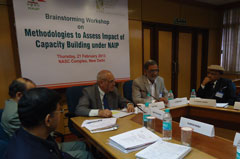
Stakeholders discussing the impacts of NAIP capacity building programs. Source: IFPRI
Developing an individual’s technical and management skills benefits more than just research output; it can positively affect future research programs, the individual’s personal growth, and the capacity of the organization they work for while having positive spillover effects on other team members. Yet despite promising outcomes from capacity strengthening programs, studies quantifying the impacts of such programs remain few. In order to identify cost and benefit indicators of capacity strengthening programs, and to work towards the goal of monitoring and tracking these benefits, a one day brain storming session, Methodologies to Assess Impact of Capacity Building Program under NAIP,was organized by the National Agriculture Innovation Program (NAIP) and the International Food Policy Research Institute (IFPRI) on 21 February, 2013 in New Delhi, India.
In the past decade the Indian Council Agriculture Research (ICAR) and the State Agriculture Universities (SAU), have invested in scaling up and improving researchers’ capacity through NAIP. More than 350 researchers have obtained additional skills through overseas collaboration and visits. Now, to develop methodologies, indicators and measurement approaches that can assess the impact of capacity building, the brainstorming session was held and attended by researchers who have led or participated in ICAR and SAU NAIP trainings. Suresh Babu, Senior Researcher, IFPRI, explained how the analytical framework of capacity strengthening in agriculture and policy research can impact process. P.K. Joshi, Director for South Asia, IFPRI, mentioned that the one year project will trace the inputs and investments in NAIP’s capacity strengthening to identify and categorize outputs by the type of research skills developed, the quality and quantity of research products, and improved productivity. The project will also identify and document technological innovations, collaborative research, and new networks that were developed as a result of researchers’ increased capacity after training.


